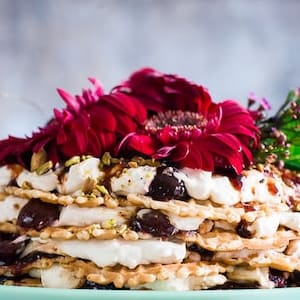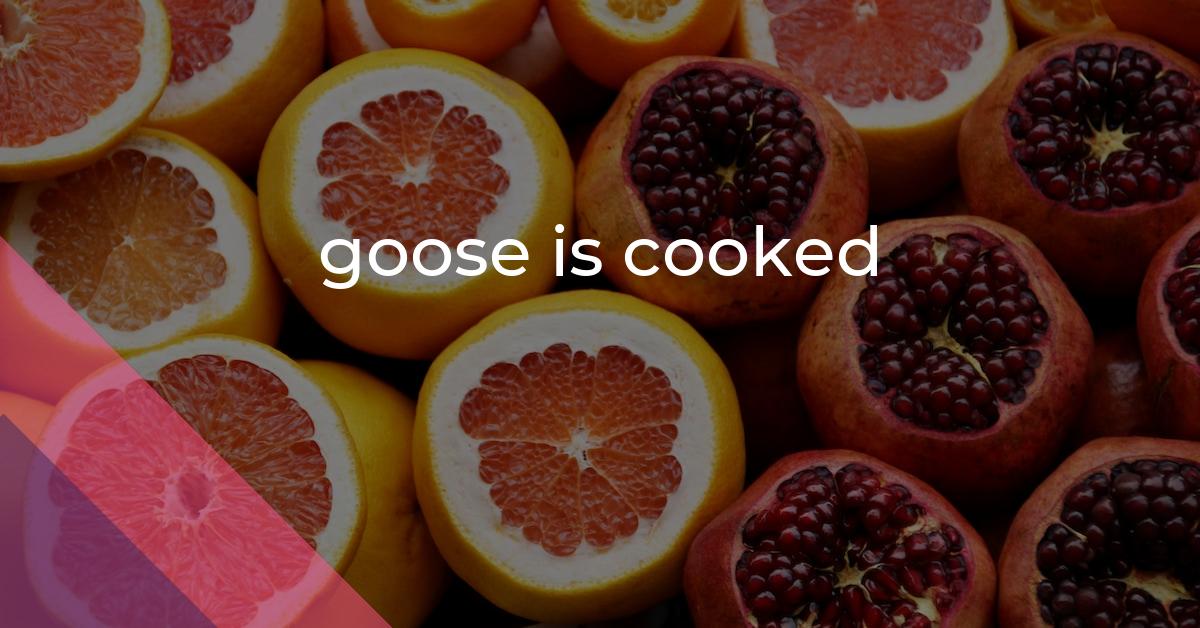goose is cooked: Idiom Meaning and Origin
What does ‘goose is cooked’ mean?
The idiom "goose is cooked" means that a person or situation is in a dire or hopeless position, with no chance of escape or success.

Idiom Explorer
The idiom "kettle of fish" refers to a difficult or messy situation. It implies a situation that is full of complications, problems, or confusion.
The idiom "in the toilet" means that something is in a troubled or bad state, typically referring to a situation that has gone wrong or is failing. It is a casual expression that implies a negative outcome or result.
The idiom "in a bind" means to be in a difficult or challenging situation where there are not many options or solutions available.
Idiom Analysis:
The idiom "in a bake" means to be in a difficult or challenging situation, like being caught in a sticky situation. It implies feeling trapped or overwhelmed by circumstances.
The idiom "hot water" refers to being in a difficult or troublesome situation, often due to one's own actions or decisions.
The idiom "go the way of the dodo bird" means to become extinct or disappear completely, like the dodo bird did several centuries ago. It implies that something or someone is on the path towards total disappearance or obsolescence.
The idiom "go down the toilet" means to fail completely or be wasted, often used to describe a situation, plan, or investment that has gone wrong or lost its value.
The idiom "go down the pan" means to fail or deteriorate significantly.
The idiom "go down in flames" means to suffer a significant and public failure or defeat. It is often used to describe a situation where all efforts or plans end in disaster or are unsuccessful.
Unveiling the Culinary Fate of a Goose
The idiom “goose is cooked” is a figurative expression that conveys a sense of hopelessness or doom. Its origin is uncertain, but one theory is that it may have originated from the English dish roast goose. In this traditional dish, the goose is cooked until it is well-done, and the phrase “the goose is cooked” may have been used to indicate that the goose has been fully cooked and is beyond saving. Over time, this culinary reference may have evolved into a figurative expression to suggest that someone's fate is sealed and there is no way out.
Another possible origin of the idiom is from the game of chess. In chess, the term “zugzwang” refers to a situation where a player is forced to make a move, even though any move will ultimately weaken their position. This concept of being trapped and having no viable options may have influenced the development of the idiom “goose is cooked” to convey a similar sense of inevitability.
It is important to note that the idiom “goose is cooked” is primarily used in informal contexts and is not commonly found in formal or academic writing. It is most often used in spoken language, particularly in American English. Despite its informal nature, the idiom has gained popularity and widespread usage over the years.
The idiom “goose is cooked” has been used in various forms of media, including literature, music, and film. Its usage in these mediums has further solidified its place in the English language and cultural vernacular.
When someone's "goose is cooked", it means that they are in a situation that is hopeless or doomed. This figurative expression can be used to describe a person who is trapped or facing insurmountable challenges. It implies that there is no way out of the situation and that their fate is inevitable.
An interesting connection can be made between the idiom “goose is cooked” and the expression "cook someone's goose". While both idioms use the imagery of cooking, they convey slightly different meanings. "Cook someone's goose" is often used to describe a situation where someone's plans or chances of success are ruined or thwarted. It suggests that someone or something has caused harm or damage to someone else's prospects or opportunities. So, while both idioms use the idea of cooking, they have distinct connotations and contexts in which they are used.
Similarly, the idiom “goose is cooked” shares some similarities with the expression "dead duck". "Dead duck" is another idiomatic phrase that implies a hopeless or doomed situation. It suggests that a person or thing is in a state of irreparable damage or failure. Like "goose is cooked", "dead duck" conveys a sense of finality and inevitability. However, "dead duck" is more commonly used to describe a failed or unsuccessful endeavor, while "goose is cooked" can apply to a broader range of situations.
The idiom “goose is cooked” is a figurative expression that signifies a situation that is hopeless or doomed. Its origin is uncertain, but it may have come from the culinary reference of a fully cooked goose or the concept of being trapped in chess. It is most commonly used in informal contexts and has gained popularity over the years. Connections can be made between the idiom “goose is cooked” and expressions such as "cook someone's goose" and "dead duck", although they have distinct meanings and contexts. Overall, these idioms serve as reminders of the limitations we face in life, while also highlighting the potential for resilience and growth.
Example usage
1. After breaking his mother's favorite vase, John knew his goose was cooked.
2. When the police caught the thief in the act, he realized his goose was cooked.
3. Despite his attempts to cover up the mistake, Tom's boss discovered the error and his goose was cooked.
More "Food" idioms



